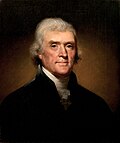Contents
- Incumbents
- Federal government
- Governors
- Lieutenant governors
- Events
- Ongoing
- Births
- Deaths
- See also
- Further reading
- External links
| |||||
| Decades: | |||||
|---|---|---|---|---|---|
| See also: | |||||
| 1801 in the United States |
| 1801 in U.S. states |
|---|
| States |
| Washington, D.C. |
| List of years in the United States by state or territory |
Events from the year 1801 in the United States.



